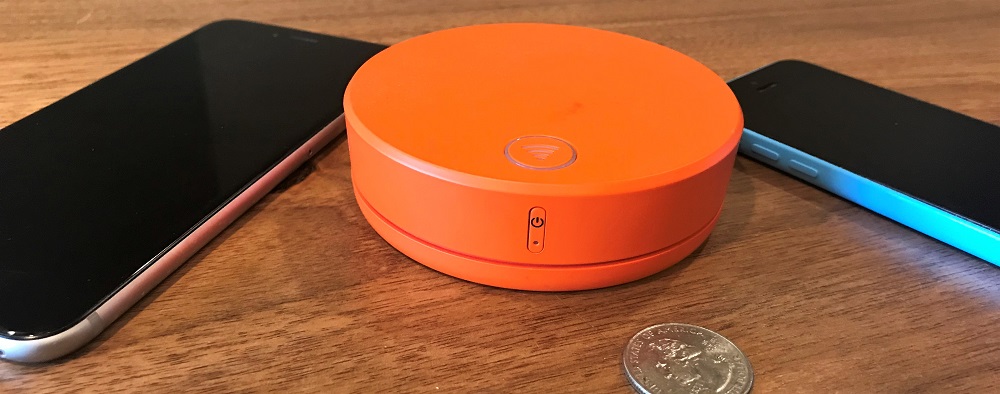NOTICE: This post references card features that have changed, expired, or are not currently available
Pondering international roaming options…
My family has been with AT&T wireless for years. Service has been good, and we locked in an old mobile share plan (a type of family plan) that makes the service relatively cheap for unlimited talk & text, and more than enough high-speed data for the 5 of us on this plan (30 GB per month, plus rollover of unused data from previous month).
The problem is that we’ve been traveling internationally more and more. AT&T used to charge just $30 for 30 days of their international Passport service, which offers unlimited texts, inexpensive calls, and a small amount of data. We would sign up for this before traveling and turn off our data roaming except when in a pinch. Now, though, the cheapest Passport option is $60 for 30 days. When 3 or 4 of us travel together, it adds up fast.
The International Day Pass Option: $10 Per Day
Meanwhile, AT&T has another option: International Day Pass for $10 per device per 24 hours (Verizon has a similar option). This option includes unlimited talk and text, and uses data from your regular plan.
For travel to Japan, Germany, and the UK this past summer, we used the International Day Pass. I turned on my phone’s hotspot, and my family turned off data roaming and connected to my phone for internet. This approach worked well most of the time, but when we were apart, family members either had to go without internet or activate their own $10 day. Somehow my son activated his quite often.
Advantages:
- Keep your own number for talking & texting
- Plenty of high speed data available (just like at home)
- Can share data with travel companions
Disadvantages:
- Phone battery drained more quickly than usual when used as a hotspot
- $10 per day adds up, especially when travel companions decide to use their own day passes 🙂
- It’s difficult to keep track of when the 24 hours starts and ends so it’s easy to accidentally trigger another $10 at an inopportune time (such as when boarding the plane to fly home).
Swap your SIM
A tried and true approach to saving money when traveling internationally is to buy a prepaid SIM at your destination. Often these are cheap and include plenty of data. I’ve done this before, but I find it inconvenient. I don’t want the headache of trying to find a cheap SIM after a long flight. Plus I’d rather not mess with popping tiny SIM cards in and out of my phone. And, of course, I want to keep my usual phone number for texts and calls.
Advantages:
- Cheap
- Pay only for what you need
Disadvantages:
- New phone number for talking & texting
- Must ensure that your phone is unlocked first
- Requires some work: finding a good SIM deal, and swapping SIMs (the latter isn’t hard though)
International SIMs offer a middle ground: You can buy one before you travel and use the same SIM in many places around the world. While I haven’t looked into this option in-depth, I believe that you’ll pay a lot more than a SIM bought locally. You can find a round-up of international SIM options here.
International Hotspot Device
A while ago, SkyRoam sent me a free SkyRoam Solis device, presumably with the hope that I’d write a positive review. The idea is that this device is a portable hotspot that works almost anywhere in the world. The usual cost for service is $9 per 24 hours.

I used the device a bit in Italy last year and again in Quebec City last weekend. Overall, it worked very well. In Quebec, I tried making a call over Skype while connected to SkyRoam and the call quality was great. The downside? I hate, hate, hate how big the thing is. While it can be crammed into your pocket, it’s not at all comfortable.
The usual price for the device, $9 per day, doesn’t make much sense to me since it’s only $1 cheaper than using my own phone. That said, SkyRoam has a new Go Data plan that costs only $9 per month. With this plan you get 1 GB of data per month and can buy more data as needed. That’s pretty appealing.
If SkyRoam was about 1/4th it’s current size (but still with good battery life), I’d go with the Go Data plan and I’d be done. But it’s not.
Google’s Project Fi
Google’s phone service, called Project Fi, offers compelling prices for those who often travel internationally. You pay just $20 per month for basic phone service, plus $10 per Gig of data. That pricing works in all 170+ supported countries. And if you use a lot of data, it’s still not bad since data pricing is capped at $60 for a one person plan.

This sounds great except for one big gotcha: Project Fi officially supports a very limited set of phones. Everyone in my family currently has iPhones, and I’m not eager to switch.
T-Mobile
T-Mobile offers free international low-speed data. I thought about switching to T-Mobile for this feature, but then talked to a friend who lives in my neighborhood. He uses T-Mobile and reports that local coverage is awful. That simply won’t work for me. Whenever we have trouble with our Comcast internet, I use my phone’s LTE data as a backup. I wouldn’t want to lose that option.
Sprint
Like T-Mobile, Sprint’s low-speed international data is included for free with many of their plans. Unfortunately, their US-based coverage is usually rated worst of the big 4 (Verizon, AT&T, T-Mobile, Sprint).
Sprint 1 Year Free
Sprint is currently offering 1 year of free service for those with eligible phones who port over. You must sign up through the link: www.sprint.com/1yearfree. This service includes includes Sprint Global Roaming, with “data up to 2G speeds and text messaging in any of our 185+ international destinations at no charge, plus calling for just $0.20 a minute.”
A long list of phones are eligible for this deal, including these iPhones:
- Apple iPhone 5c (Verizon only)
- Apple iPhone 5s (Verizon only)
- Apple iPhone 6
- Apple iPhone 6 Plus
- Apple iPhone 6s
- Apple iPhone 6s Plus
- Apple iPhone 7 (Verizon only)
- Apple iPhone 7 Plus (Verizon only)
- Apple iPhone 8 (Verizon only)
- Apple iPhone 8 Plus (Verizon only)
- Apple iPhone SE
- Apple iPhone X (Verizon only)
My plan is to try this out for a year without giving up my current phone or service. I setup a prepaid T-Mobile plan for $3 so that I can port that new number over to Sprint. And I dug out an old iPhone 6 (which I meant to sell, but never got around to it) to use for the conversion. I’m now waiting for AT&T to unlock the old iPhone. My thinking is that I can carry around the iPhone 6 as a hotspot when traveling internationally. Plus, I can test Sprint service locally for free.
Bottom Line
If I can get the free year of Sprint service working, then I can try it out for a year risk-free. I’ll use Sprint on a backup phone so that I don’t have to give up anything in the meantime. If I have trouble with Sprint’s data when traveling, or if I need faster data, I can always enable my AT&T International Day Pass.
If I ever escape the Apple ecosystem, I’d be interested in trying out Project Fi. Unfortunately, they don’t yet officially support Samsung phones. If I was going to leave Apple, I’d want to go to Samsung so that I can use Samsung Pay with my Altitude Reserve card (3X rewards on mobile payments).
For those who travel often but want to stick with their current devices and phone plans (like me), the best option is arguably SkyRoam’s Go Data plan for $9 per month (plus $9 per additional Gigabyte), with no contract required. I just wish their device wasn’t so darn big!






[…] International Roaming: AT&T / Verizon vs. Project Fi vs. T-Mobile vs. Sprint vs. SIMS vs. Hotspo…. […]
How whould you rate it now google fi now supports iphones.
Official iPhone support is great. Now I hope they fix some issues they have with iPhone and Fi (voicemail and text messaging quirks)
[…] International Roaming: AT&T / Verizon vs. Project Fi vs. T-Mobile vs. Sprint vs. SIMS vs. Hotspo…. […]
[…] In a previous post, I covered many options available to international travelers, along with my thoughts about how well each option fits my own circumstances. If you have questions about why I didn’t buy an international hotspot device or why I don’t just pick up a sim each time I travel, please see this post: International Roaming: AT&T / Verizon vs. Project Fi vs. T-Mobile vs. Sprint vs. SIMS vs. Hotspo…. […]
I just wanted to provide some additional data points. I have Sprint. I went to Panama for 4 days and 3 nights and had high speed for two days and used the free roaming the other two. The 4G speeds ($5 a day or $25 a night) rock and were super fast. The 2G is now usable as compared to several years ago because it is throttled 4G. Recently completed a three week trip which included time on a layover in Taiwan and Hong Kong and again free Sprint international roaming was throttled 4G and fine for basic tasks. Spent longer periods of time in Indonesia and Sri Lanka. In Indonesia I purchased 4G pass for one week ($25) and it carried over to a layover in Kuala Lumpur and my first day in Sri Lanka, and the 4G rocks and if you pay for a week it works anywhere Sprint has 4G roaming. I used both the free and bought 4G one day in Sri Lanka and again I can say the free is slow but usable, but the 4G data rocks.
Great to hear!
[…] month I described my hunt for a good international data roaming solution: International Roaming: AT&T / Verizon vs. Project Fi vs. T-Mobile vs. Sprint vs. SIMS vs. Hotspo…. I’ve been using AT&T for years and service has been very good, but their international […]
Wow this is all good to know! I’ve been using sprint for years because it was the only carrier that worked inside my house (vs Att, Verizon). Anyway I use the international free roam in Japan (Tokyo Osaka) and Hong Kong and I think it’s just fine. I noticed it doesn’t work at all in Macau for me. Now Paris last year coverage was slooow and useless. I wish I would have known about the $5 day pass cuz I woulda got it! To humor/coddle my friend last year I walked to 8 or 12 Mono Prix using only a paper map and my high school french. She had her Japanese carrier iPhone on airplane mode to avoid charges. She wanted a Mono Prix that carried groceries…not all do…we could find a Mono Prix…but only clothes etc…find and walk to the next one…no groceries…. It took all day! I walked 12 miles! She ended up buying a big chunk of butter and three reusable Mono Prix shopping bags…wth. It was a disaster. I think it actually ruined the trip. I’m still mad about it. No more trips with her. It all coulda been solved with a $5 a day pass!
I wanted this service to work, but it’s a huge disaster. Service initiated in March 2018 and in June an update to the software disabled the VPN. That’s never been fixed. Now, while traveling in Italy, one of our two phones can’t connect to a network at all, only wifi, except, I can’t wifi call on either of them. Very, very, very, incapable customer service with this outfit. If they plan to remain viable they better get much better management on board.
which international service was a disaster? Google Project Fi? Sprint, Tmobile? can’t tell which one you mean.
I I bought the Skyroam Solis recently for a 5-day trip to London. Didn’t get a signal once. Not once. No matter where I was, indoors or out, anywhere in Central London. It’s basically a very expensive paperweight.
[…] We’re enjoying our service with T-Mobile but I was interested in Greg’s post on Frequent Miler about the different options available when you need to use international roaming on your phone. […]
One caveat for TMobile for those who do a lot of international travel. I recently spent a lot of time in Europe for about 3 months in a row. I got a message from TMobile warning me that if I went over 50% international usage for another month, I would be in violation of terms. Not sure what the penalty would have been. I’m still very happy with TMobile international service, and coverage at home.
I have a postpaid $17/month T-Mobile tablet plan. I suspend it when I’m not abroad. When I am abroad I keep it active and it’s 57 cents a day for unlimited 2G. Sometimes faster if there’s a promo. I sometimes splurge for high speed. It’s wayyyy cheaper than AT&T $10 a day. On my last week long trip I spent under $4.
I bought one of the Skyroam gadgets – or, what my wife refers to as “the orange hockey puck from hell.” Miserable experience, without question the absolute worst tech gear I have ever had the misfortune to own. Horrible junk, stay away.
Not sure if someone mentioned this, but sprint offers $5/day $25/week LTE roaming options in most countries, and I’ve gotten very fast speeds in asia.
T-mobile offers a free signal booster for home use. It gives 5 bars and even in rural areas. Their international data plan is hard to beat since it is included in their monthly rate.